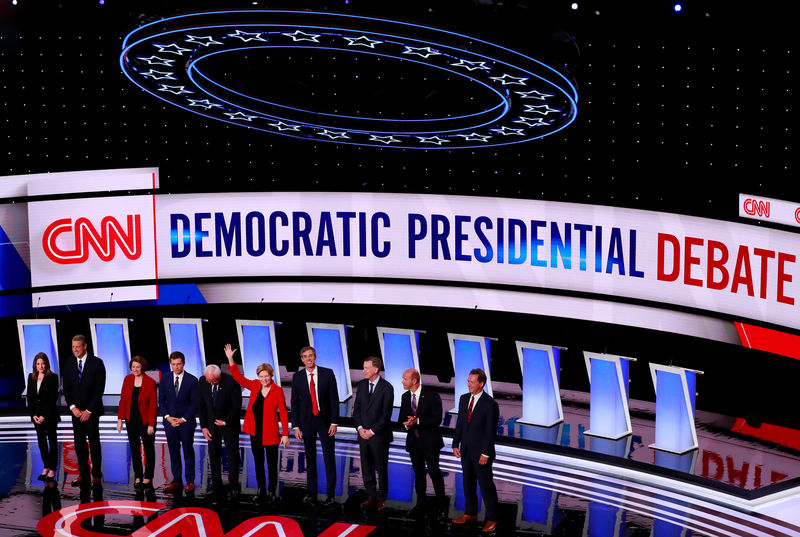By Amanda Becker
WASHINGTON (Reuters) - Two national opinion polls released on Wednesday of Democrats vying for their party's 2020 presidential nomination did not show any of the candidates at the back of the crowded pack picking up enough support to qualify for the next debate in September.
Wednesday night is the deadline to meet the party's polling and fundraising thresholds for next month's televised debate. Appearing on stage with the other candidates is crucial to keeping alive hopes for being the Democratic nominee to take on Republican President Donald Trump in November 2020.
The 10 candidates who have already made the cut are due to debate in Houston on Sept. 12. If at least one more candidate qualifies, a second debate will be held on Sept. 13.
Polls released on Wednesday by Quinnipiac University and USA Today/Suffolk University showed no significant gains made by any of the candidates still seeking the needed support.
To qualify for the September debate, candidates must have received donations from a minimum of 130,000 donors, with at least 400 unique donors per state in at least 20 states, and earned at least 2% support in a minimum of four qualifying polls.
Billionaire environmental activist Tom Steyer and U.S. Representative Tulsi Gabbard of Hawaii both have at least one qualifying poll but need more ahead of the deadline. Neither crossed the 2% threshold in either of the two polls released on Wednesday.
Nor did U.S. Senator Kirsten Gillibrand of New York. Her 2020 campaign said on Wednesday she would exit the race after it became clear "that she will not have access to the September debate stage." Her withdrawal still leaves 20 Democratic presidential contenders.
BIDEN LEADS ON POLLS
In the Quinnipiac poll, former Vice President Joe Biden was in the lead with 32% support from Democratic voters and independent voters who lean Democratic. Progressive (NYSE:PGR) U.S. Senators Elizabeth Warren of Massachusetts and Bernie Sanders of Vermont were in second and third, with 19% support and 15% support respectively.
U.S. Senator Kamala Harris of California, with 7% support, and South Bend, Indiana, Mayor Pete Buttigieg, with 5%, rounded out the top five.
Biden also led in the USA Today/Suffolk poll with 32% support, up slightly from a previous poll taken in June. Warren was at 14% and Sanders at 12%.
Some of the lower-polling candidates have complained about the process the Democratic National Committee used to determine which candidates make it on to the debate stage.
The campaign of author Marianne Williamson, who qualified for the first two debates by receiving contributions from 65,000 donors and reaching 1% in three sanctioned polls, complained in an email to supporters early on Wednesday that she had hit 2% in four polls but that just one was considered an "official" poll by the DNC.
"If the DNC had followed the process they announced in February and kept to the promised 17 qualifying polls, the lineup of the upcoming third debate might be very different," Williamson spokeswoman Patricia Ewing said in a statement.
Gabbard has likewise complained she has hit 2% support in dozens of polls but just two accepted by the DNC. Montana Governor Steve Bullock, who also has not qualified for the September debate, has said the DNC created a qualifying process akin to the "Hunger Games."

The DNC announced the two-pronged criteria for debate qualification earlier this year to contend with a Democratic field that has at times swelled to as large as 24 candidates. DNC Chairman Tom Perez has defended setting stepped-up qualifying criteria for the third and subsequent debates, saying candidates need to show they are making progress.